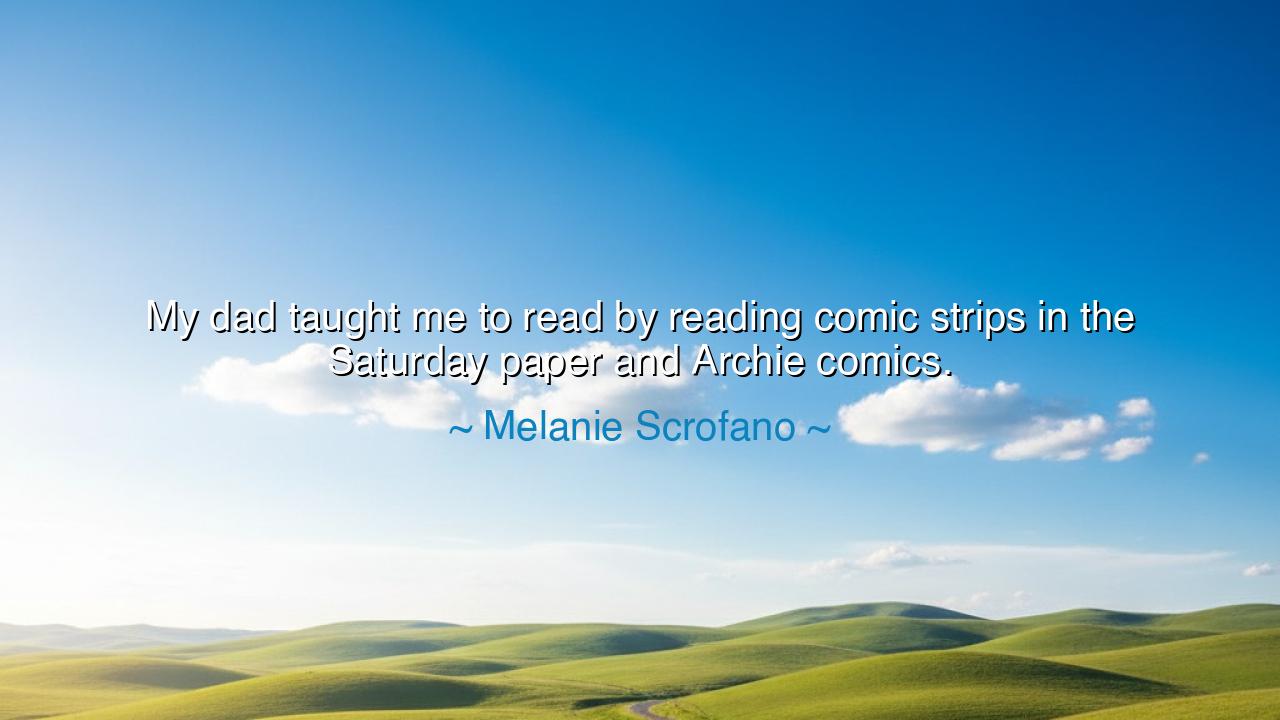
My dad taught me to read by reading comic strips in the Saturday
My dad taught me to read by reading comic strips in the Saturday paper and Archie comics.






“My dad taught me to read by reading comic strips in the Saturday paper and Archie comics.”
Thus spoke Melanie Scrofano, reflecting on a humble yet profound moment of learning and connection. In her words, we glimpse the timeless truth that education begins not only with books, but with love, guidance, and creativity. Her father did not hand her a tome of wisdom or a strict curriculum; he offered something equally transformative — engagement, curiosity, and shared joy. From comic strips and Archie comics, she learned letters, words, and stories — but also the deeper lesson that learning can be playful, intimate, and alive.
The origin of the quote lies in the everyday life of a child discovering the world through the gentle mentorship of a parent. Comic strips, often dismissed as trivial, became in this household a doorway to literacy. The father, by reading with his daughter, made learning a shared adventure, where letters and images intertwined to spark imagination. In this simplicity lies a profound insight: true teaching is rooted in attention and love, not solely in textbooks or authority. The father’s patience and creativity allowed the young mind to flourish naturally, guided by enjoyment rather than pressure.
The ancients would have recognized this wisdom. Socrates, the great philosopher of Athens, taught not by dictating knowledge, but by engaging his students in dialogue, questioning, and discovery. Similarly, Aristotle emphasized learning through observation and interaction with the world. Melanie’s father, with his comic strips, echoes this ancient method: he created an environment where knowledge could grow organically, where curiosity was nurtured, and where learning was a shared journey rather than a solitary task.
This method of teaching carries a deeper lesson about the power of imagination and narrative. Comic strips are more than pictures and words; they are stories that communicate character, emotion, and consequence. By exploring these worlds, Melanie learned the rhythm of language, the structure of story, and the emotional resonance of narrative. The father transformed literacy into a living experience, showing that education thrives when it engages the heart as well as the mind. History offers many parallels: the great storyteller Aesop taught moral lessons through fables, demonstrating that narrative can instill wisdom more effectively than abstract instruction alone.
Furthermore, this story illustrates the importance of parental involvement. A father who reads with his child does more than teach letters; he imparts a model of engagement, curiosity, and patience. It is through such guidance that a child internalizes both the joy of learning and the value of shared experience. Across time, societies have recognized the parent as the first teacher — not merely of knowledge, but of the love of knowledge. From Confucian households in ancient China to medieval European apprenticeships, the presence of a guiding hand has always been a cornerstone of human growth.
Melanie’s reflection also underscores the value of play in education. Learning through comics is a form of play that stimulates attention, imagination, and cognitive development. The father’s creativity made learning pleasurable, ensuring that it was remembered and cherished. Ancient educators, from Plato to Quintilian, recognized that lessons are most deeply absorbed when the mind is engaged willingly and joyfully. By weaving literacy into play, her father honored a truth as old as civilization: the best learning is that which does not feel like labor.
The lesson, then, is clear: teaching is most effective when it combines love, creativity, and attention. Even the simplest tools — comic strips, storytelling, shared play — can ignite a lifelong passion for knowledge. Parents, mentors, and teachers are reminded that their role is not merely to instruct, but to inspire curiosity, to guide exploration, and to make the world of learning a place of delight and discovery.
In the end, Melanie Scrofano’s words reveal the quiet power of ordinary moments. A father reading comics is not trivial; he is shaping a mind, a heart, and a future. Let us honor the simple, patient acts of teaching that open the gates of imagination, and remember that the seeds of wisdom often grow from laughter, stories, and the shared attention of one who believes in us.






AAdministratorAdministrator
Welcome, honored guests. Please leave a comment, we will respond soon